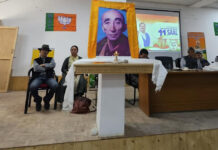As the country reported the first confirmed case of human death due to Avian influenza, AIIMS chief Dr. Randeep Guleria on Wednesday said that human-to-human transmission of the H5N1 virus is very rare and there is no need to panic.
However, there is a need to do contact tracing and also take samples and look for any poultry deaths in the area from where the child who died due to the virus was residing, the AIIMS director said.
As the country reported the first confirmed case of human death due to Avian influenza, AIIMS chief Dr. Randeep Guleria on Wednesday said that human-to-human transmission of the H5N1 virus is very rare and there is no need to panic.
However, there is a need to do contact tracing and also take samples and look for any poultry deaths in the area from where the child who died due to the virus was residing, the AIIMS director said.https://googleads.g.doubleclick.net/pagead/ads?client=ca-pub-8829573953691067&output=html&h=280&adk=3259916396&adf=220102852&pi=t.aa~a.1209929155~i.3~rp.4&w=740&fwrn=4&fwrnh=100&lmt=1626922193&num_ads=1&rafmt=1&armr=3&sem=mc&pwprc=6674331878&psa=1&ad_type=text_image&format=740×280&url=https%3A%2F%2Fjkmedia.net%2Fhuman-to-human-transmission-of-bird-flu-rare-no-need-to-panic-aiims-chief%2F&flash=0&fwr=0&pra=3&rh=185&rw=740&rpe=1&resp_fmts=3&wgl=1&fa=27&uach=WyJXaW5kb3dzIiwiMTAuMCIsIng4NiIsIiIsIjkxLjAuNDQ3Mi4xNjQiLFtdLG51bGwsbnVsbCxudWxsXQ..&tt_state=W3siaXNzdWVyT3JpZ2luIjoiaHR0cHM6Ly9hdHRlc3RhdGlvbi5hbmRyb2lkLmNvbSIsInN0YXRlIjo3fV0.&dt=1626922199005&bpp=9&bdt=4892&idt=9&shv=r20210720&ptt=9&saldr=aa&abxe=1&cookie=ID%3Dc33c8c10d9a1595f-2272206073ca000c%3AT%3D1626922169%3ART%3D1626922169%3AS%3DALNI_MYAVH0MoXYqrKZbkIYPJ0FCx-78LA&prev_fmts=0x0%2C1423x789&nras=3&correlator=2987310877179&frm=20&pv=1&ga_vid=135840012.1626922169&ga_sid=1626922197&ga_hid=1626991537&ga_fc=0&u_tz=330&u_his=1&u_java=0&u_h=900&u_w=1440&u_ah=860&u_aw=1440&u_cd=24&u_nplug=3&u_nmime=4&adx=192&ady=1899&biw=1423&bih=789&scr_x=0&scr_y=0&eid=20211866%2C21067496&oid=3&pvsid=1589039541358713&pem=109&ref=https%3A%2F%2Fjkmedia.net%2F&eae=0&fc=1408&brdim=0%2C0%2C0%2C0%2C1440%2C0%2C0%2C0%2C1440%2C789&vis=1&rsz=%7C%7Cs%7C&abl=NS&fu=128&bc=31&ifi=2&uci=a!2&btvi=1&fsb=1&xpc=qpuxLRNpbI&p=https%3A//jkmedia.net&dtd=M
A 12-year-old boy from Haryana, who was infected with the H5N1 virus, recently died at AIIMS Delhi.
The National Institute of Virology, Pune had confirmed the infection, Dr. Guelria said.
”The transmission of the virus from birds to humans is rare and sustained human-to-human transmission of the H5N1 virus has not yet been established and therefore there is no need to panic.
”But then people working closely with poultry must take precautionary measures and maintain proper personal hygiene,” Dr. Guleria said. Dr. Neeraj Nischal, an associate professor in the Department of Medicine at AIIMS, said Avian influenza or bird flu is predominately a zoonosis, and there is no evidence of sustained human-to-human transmission so far. ”Although few isolated family clusters have been reported, transmission in these clusters may have occurred through common exposure and in rare situations a very close physical contact; there is no evidence of human-to-human transmission via small-particle aerosols,” he said.
According to the World Health Organisation poultry and poultry products can be prepared and consumed as usual, with no fear of acquiring infection with the avian flu virus. One should continue to follow good hygienic and cooking practices. The virus is destroyed at a temperature of 70 degrees C for 30 minutes. After handling poultry and eggs, one should clean hands and other exposed parts, it said.



























